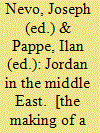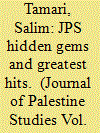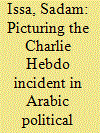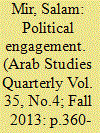| Srl | Item |
| 1 |
ID:
048801


|
|
|
|
|
| Publication |
England, Frank Cass and Co. Ltd., 1994.
|
| Description |
vii, 305p.: mapshbk
|
| Standard Number |
0714634549
|
|
|
|
|
|
|
|
|
|
|
|
Copies: C:1/I:0,R:0,Q:0
Circulation
| Accession# | Call# | Current Location | Status | Policy | Location |
| 039093 | 956.95/NEV 039093 | Main | On Shelf | General | |
|
|
|
|
| 2 |
ID:
178797


|
|
|
|
|
| Summary/Abstract |
In this essay, emeritus sociology professor Salim Tamari surveys the study of Ottoman Palestine within the pages of JPS, identifying two groundbreaking articles: Beshara Doumani’s “Rediscovering Ottoman Palestine: Writing Palestinians into History” (1992) and Louis Fishman’s “The 1911 Haram al-Sharif Incident: Palestinian Notables versus the Ottoman Administration” (2005). Tamari argues that the two contributions have, in different ways, fundamentally shifted our understanding of a local Palestinian identity within the broader Ottoman-era region of Bilad al-Sham.
|
|
|
|
|
|
|
|
|
|
|
|
|
|
|
|
| 3 |
ID:
147388


|
|
|
|
|
| Summary/Abstract |
This article investigates how the Arabic political cartoons picture the mocking cartoons of the Prophet Muhammad by the French satirical Charlie Hebdo magazine.1 It is noticed that the cartoons utilize the Charlie Hebdo incident as a locus to deconstruct the unjustness and bias of the Arabic leadership and the international community in their dealing with some Arabic political issues. The surveyed cartoons also used the Charlie Hebdo incident as a locus to formulate the Palestinian “imagined community” (Anderson, 1991). I argue that the surveyed cartoons use the strategy of “differentiation” (Meyer, 2000) based on the self vs. other dichotomy to establish this deconstruction and imagined community. The study uses the semio-linguistic and visual rhetorical tools (Barthes, 1972), and self-categorization (Turner, 1987) to achieve this deconstruction, through an analysis of semiotic-discursive aspects of a small corpus of Arabic political cartoons. The findings indicate that promoting a discourse of fear and danger toward the inside and outside actors is what constitutes this self-other-based identity.
|
|
|
|
|
|
|
|
|
|
|
|
|
|
|
|
| 4 |
ID:
124612


|
|
|
|
|
| Publication |
2013.
|
| Summary/Abstract |
The personal struggle and creative achievement of Fadwa Tuqan (1917-2003), one of the most celebrated poets in the Arab world, signify the plight of the Palestinian people in the twentieth century. Her autobiography, A Mountainous Journey, An Autobiography, integrates the personal and collective struggle within the context of Arab-Muslim history. This article will explore the established poet's shift to the confessional genre as the Palestinian Muslim woman writer investigates the historical events that befell her people. Inspired by "Poets of Resistance," I argue that the underpinnings of Tuqan's investigation of the Arab-Muslim tradition proffer an authentic, commanding voice that constructs an alternative history, challenging the dominant patriarchal paradigms. What emerges is a singular feminine voice that forges an identity that goes beyond the nightmare of history. In both the poetry and personal memoir, Tuqan's career and groundbreaking voice signify an early empowerment of women agents in the cultural production of the Arab-Muslim world.
|
|
|
|
|
|
|
|
|
|
|
|
|
|
|
|